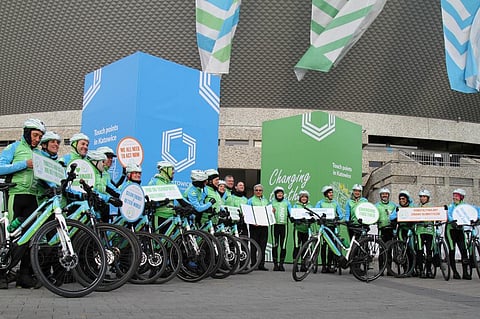

To make the 24th Conference of Parties, being held at Katowice in Poland, sustainable, the United Nations Framework Convention on Climate Change (UNFCCC) and the Polish Ministry of Environment have undertaken various measures.
The event organizers aim to avoid greenhouse gas (GHG) emissions as much as possible. “To reduce the overall climate footprint of the event, a series of measures have been arranged in areas such as waste management and paper reduction”, says Agnieszka Tomaszewska, counsellor to the Minister and Head of the Ozone Layer Protection Team, Plenipotentiary for Environmental Management in Poland’s Ministry of Environment.
The measures include arranging for sustainable transportation for participants to travel from their hotels to the conference venue. Public transportation in Katowice and the surroundings areas was made free to the participants. The staff was encouraged to use car-sharing services to further limit the use of private vehicles.
The GHG emissions made despite the measures is being documented through a carbon footprint report prepared by the host country. The emissions will be estimated as per the accepted international standards, and any emission above the accepted levels will be compensated by removing the equivalent amount of Carbon dioxide (CO2) through an afforestation project of the Polish State Forests agency.
Organisations, companies and individuals have the option of purchasing UN-certified offsets (or certified emission reduction credits) to compensate for the carbon footprint generated by their personal activities.
The credits, each equivalent to one tonne of CO2, support environment-friendly projects in developing countries and contribute to sustainable development. Those who utilise the credits will be awarded personlised certificates and a Climate Neutral Now lanyard (accessory).
Another important measure is waste-management. According to UNFCCC’s lead for UN climate change conferences, Dennis Winkler, “Waste management includes reusing, sorting and recycling materials that would otherwise be disposed of, for instance at a landfill site or through incineration, as well as avoiding or limiting the use of disposable products.”
Also, most of the conference venue will be set up using reusable materials. Part of the measures is also a reduction in paper usage. For this, all official documents were made available in a digital format.
“To further limit the use of paper, the number of pages for printing in a single session and the number of sessions available to any given user at the computer centres will be limited, with double-sided printing as the default option,” added Tomaszewska.